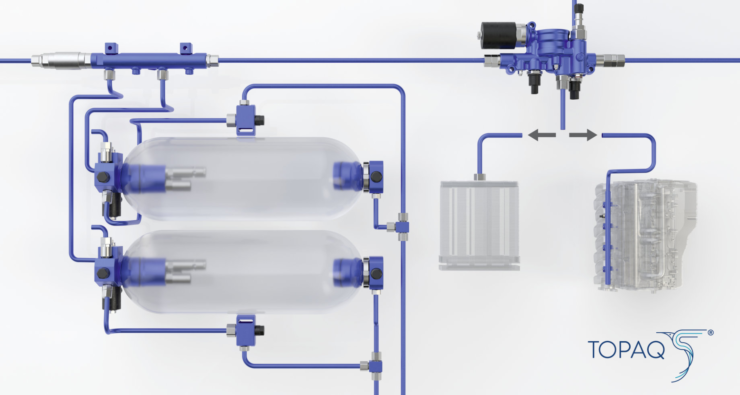Hydrogen tank valves by Poppe + Potthoff successfully complete required tests as part of the certification according to R134
H2 tank valves by Poppe + Potthoff successfully complete required tests as part of the certification according to R134
A reliable flow of hydrogen (H2) is essential in high-pressure storage applications such as in a commercial vehicle or filling station, for short refueling times. With its TOPAQ hydrogen supply system, the German family-owned company Poppe + Potthoff (P+P) offers a modular system solution that enables a safe and efficient hydrogen flow from the tank to the fuel cell or hydrogen engine. Part of this system solution are the tank valves developed by P+P, which have now successfully completed the required tests according to test standard R134.01 with several extension tests according to HGV3.1.
The On Tank Valve (OTV) can be fitted to individual tank cylinders. Several tanks can be filled in parallel via a distribution rail (Parallel Charging Unit (PCU) or also known as a manifold). Depending on the system design, refueling can take place at 350 bar or 700 bar. The innovative flow routing of the hydrogen through the OTV, together with flow rates that achieve Kv values > 0.28 during refueling, enable short refueling times. The optimized H2 inflow into the tank also prevents hotspots inside the tank cylinders.
Short refueling times during operation and rapid degassing in the event of a fire
During development, the OTV was optimized to weigh less than 1400 g with a diameter of 160 mm, including a solenoid valve. The built-in solenoid valve is ‘normally closed’ so that the tanks are closed pressure-tight when no electrical current is present. The cable outlets are bundled on one side, which makes installation and positioning easy. The modular design allows easy integration of various functionalities according to customer requirements. The OTV has a central connection for filling and emptying, as well as an optional connection for a pressure sensor, for example.
The Thermal Pressure Relief Device (TPRD) enables rapid, spatially targeted degassing in the event of a fire and prevents the uncontrolled leakage of hydrogen from the tanks. The component can be installed in different valve variants via a standardized interface: installed in an OTV, as an End Plug and as a Remote TPRD. While the OTV is located at the front and the End Plug TPRD at the rear end of the tank cylinder, the Remote TPRD is attached to the side of the tanks. This permanently ensures that if the activation temperature is exceeded, the TPRDs are triggered, and the tank system is emptied safely.
Reliable and efficient hydrogen supply thanks to TOPAQ system solution
Going beyond the product level, P+P offers a solution at system level with TOPAQ. The company uses its material, development and production expertise to develop and manufacture all TOPAQ core components independently. In addition to tank valves, this includes H2 lines, distribution rails, High Pressure Regulation Units (HPRU) and rails for H2 injection systems on the H2 engine. The validated P+P interfaces allow up to 25 assembly repetitions without leaks. Thanks to its modularity, TOPAQ enables application-optimized system architectures for use in mobile and industrial applications.
READ the latest news shaping the hydrogen central at Hydrogen News
Hydrogen tank valves by Poppe + Potthoff successfully complete required tests as part of the certification according to R134, source









